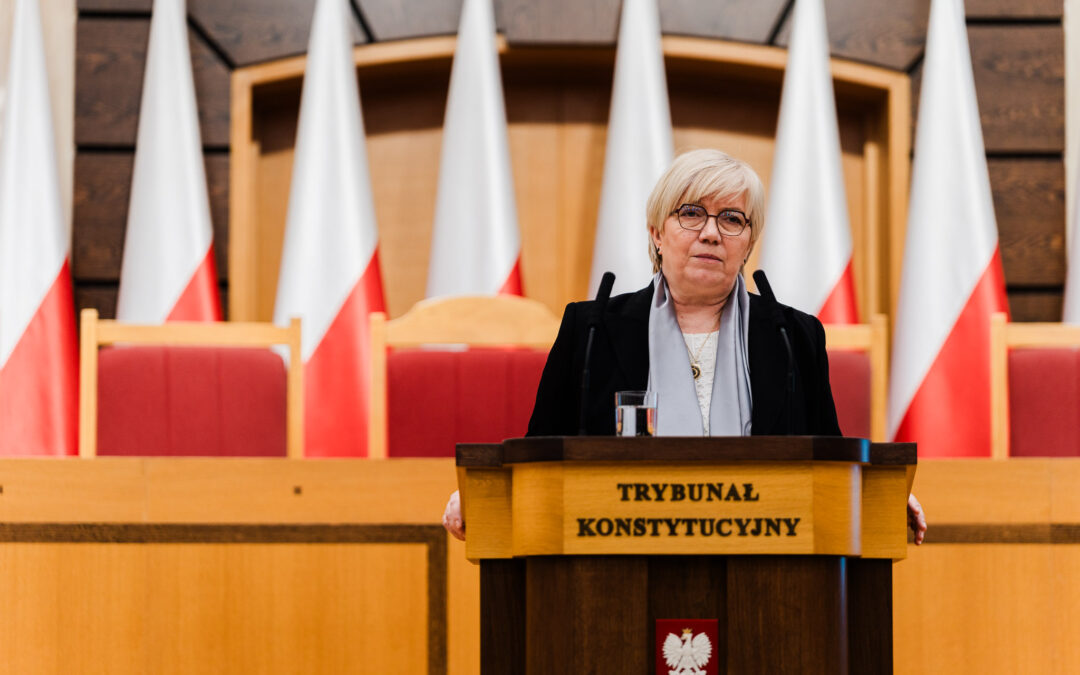Keep our news free from ads and paywalls by making a donation to support our work!

Notes from Poland is run by a small editorial team and is published by an independent, non-profit foundation that is funded through donations from our readers. We cannot do what we do without your support.
Poland’s Constitutional Tribunal (TK) has ruled that a recent change made by the new government to how religion classes – which consist of Catholic catechism teaching – are organised in schools is unconstitutional.
The decision has been welcomed by the Catholic church, which is responsible for organising the classes in public schools. But it is almost certain to be rejected by the government, which regards the TK as an unlawful body in its current form and has regularly ignored its rulings.
Zdaniem @TK_GOV_PL @MEN_GOVPL , przygotowując zmiany w prawie oświatowym dotyczące lekcji religii, nie spełniło zapisanego w stosownych aktach prawnych wymogu działania w porozumieniu z Kościołami i innymi związkami wyznaniowymi.https://t.co/qlbymhrqkD
— eKAI (@ekaipl) November 27, 2024
When a new, more liberal government came to power late last year, education minister Barbara Nowacka immediately pledged to reduce the amount of religion teaching in public schools and to reorganise the classes – which are optional but taken by most pupils – so they would be less disruptive to children who do not attend.
One change that was implemented at the start of the school year in September was to allow schools to create religion classes composed of pupils from different year groups, rather than from single cohorts as was previously the case.
That move was opposed by the Catholic church, which asked the head of the Supreme Court, Małgorzata Manowska – an appointee of the former, national-conservative Law and Justice (PiS) government – to petition the TK to assess the constitutionality of the government’s action.
The church claimed that the change would cause many religion teachers to lose their jobs and could threaten children’s religious education by grouping together pupils of different ages with different needs. It also argued that the government should have consulted with the church before making its decision.
At the end of August, just before the school year began, the TK issued an interim order requiring the government to halt the change while the tribunal considered the case. However, that order was ignored, with Nowacka saying it “has no legal effect”.
Today, the TK issued its final ruling on the issue, finding the education ministry regulation introducing the change to religion classes to have been unconstitutional.
The tribunal found the regulation violated part of Poland’s 1991 education law which states that the education minister must decide on the manner that religion is taught in schools “in consultation with the authorities of the Catholic church and…other churches and religious associations”.
In implementing the change, Nowacka violated parts of the constitution relating to the issuing of regulations, cooperation between church and state, acting within the limits of the law, and ensuring that Poland is a democratic state ruled by law, found the TK.
The church has criticised the government's decision to remove Catholic catechism classes from school grade averages.
The church argues it is "unfair" for pupils who take the subject. But the education ministry says it ensures "equality" for all students https://t.co/VBx6CvO0FO
— Notes from Poland 🇵🇱 (@notesfrompoland) April 11, 2024
The ruling was immediately welcomed by the Catholic church, whose spokesman, Leszek Gęsiak, told the Polish Press Agency (PAP) that it “confirms the legal doubts of the church regarding the compliance of the education minister’s regulation with higher-level acts [of law]”.
The education ministry has not yet commented on the ruling, which in theory renders Nowacka’s regulation invalid. However, it is almost certain to dismiss it as invalid. The government argues that the TK is no longer a valid body, given that some of its judges were appointed unlawfully under the former PiS government.
They also say that the TK’s chief justice, Julia Przyłębska, was improperly appointed and that in any case her term has already expired. Przyłębska – who is a close personal associate of PiS chairman Jarosław Kaczyński – was the chair of the three-judge TK panel that issued today’s ruling.
When the TK was considering the school religion case, Nowacka informed the tribunal that she would not participate, citing a parliamentary resolution from March this year declaring that Przyłębska is “not authorised” to head the body.

Notes from Poland is run by a small editorial team and published by an independent, non-profit foundation that is funded through donations from our readers. We cannot do what we do without your support.
Main image credit: T. Tołłoczko/TK (under CC BY-NC-ND 3.0 PL)

Daniel Tilles is editor-in-chief of Notes from Poland. He has written on Polish affairs for a wide range of publications, including Foreign Policy, POLITICO Europe, EUobserver and Dziennik Gazeta Prawna.



















